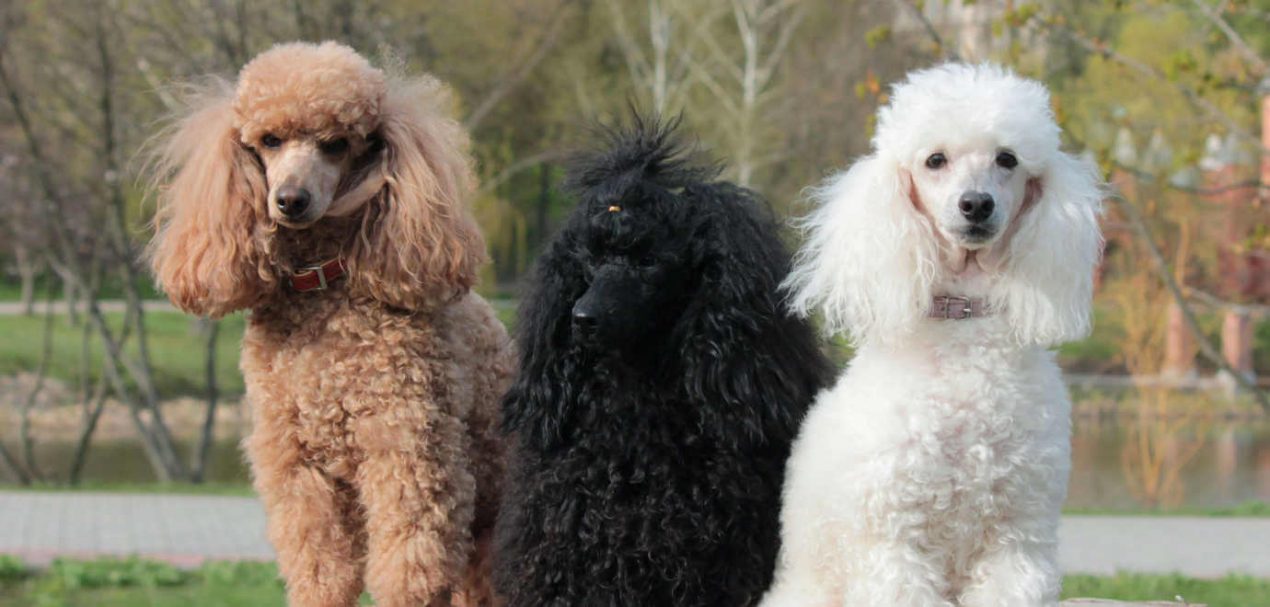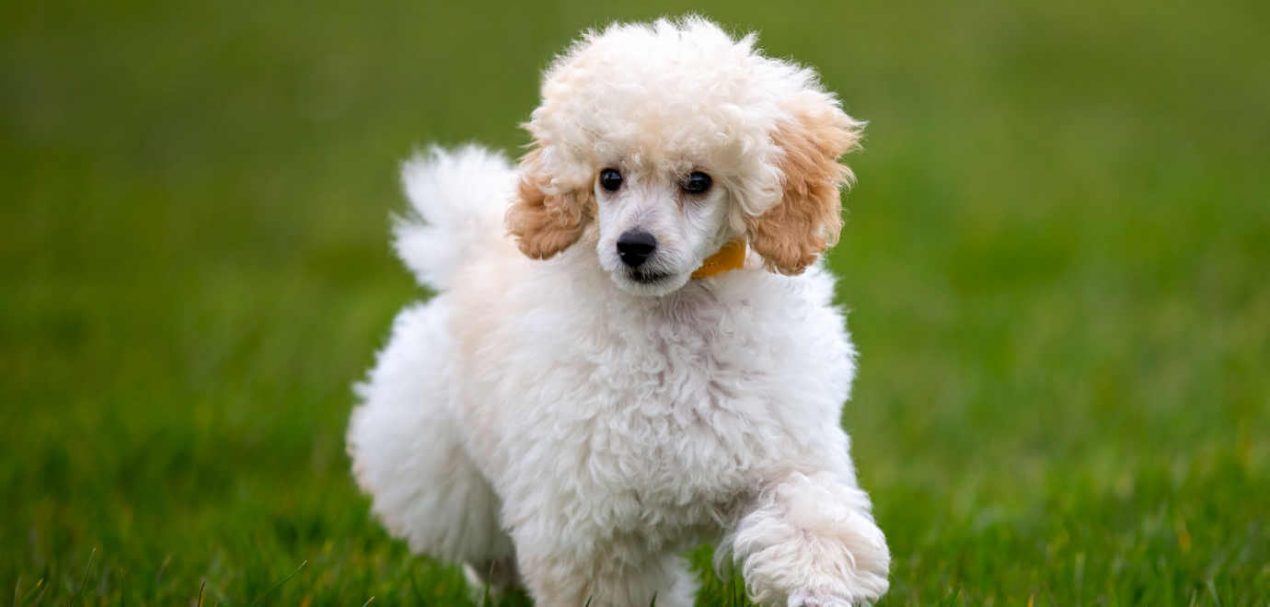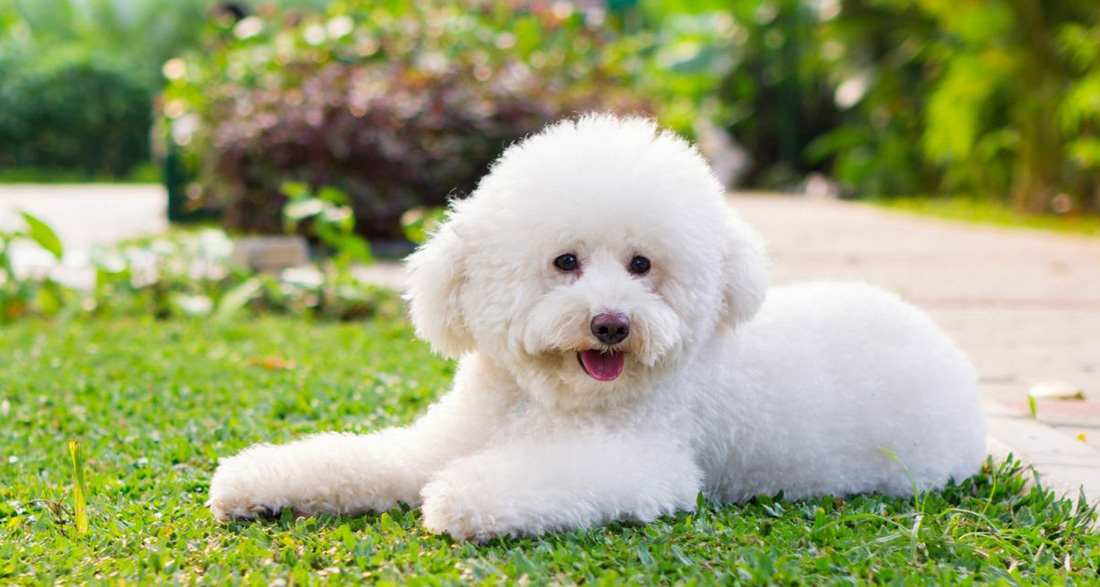As a charming and intelligent companion and pet, the Toy Poodle delights dog lovers worldwide. This lively four-legged friend knows how to win hearts effortlessly. With its deeply rooted friendliness, it is a loyal companion who certainly has a mind of its own. Here’s what you should know about this charmer before getting one and why Toy Poodles are true all-rounders.
History of the Toy Poodle
The history of the Poodle goes back a long way, marked by the fact that not all Poodles are the same. What is the difference between a Toy Poodle and a Miniature Poodle?
Toy and Miniature Poodles differ in size. While the Miniature Poodle typically stands 28 to 34 cm tall at the withers and weighs up to 7 kg, the Toy Poodle is significantly larger, with a withers height of 35 to 45 cm.
The “Beautiful Poodle” was first mentioned in writing as a breed of dog in 1555. This active and retrieving-loving canine was used for waterfowl hunting at that time. Its affinity for water was deliberately utilized, and to facilitate its movement, its fur was intentionally trimmed.
Thanks to its intelligence and adaptability, the Poodle remains a true all-rounder to this day. It could enrich your life too, as it is quite adaptable and, despite its hunting skills, an entertaining companion and pet.
Breed Overview
GROUP: Toy
HEIGHT: 8 to 10 inches
WEIGHT: 6 to 9 pounds
COAT: Curly and dense
COAT COLOR: Apricot, black, blue, brown, cafe au lait, cream, gray, red
LIFE SPAN: 14 to 17 years
TEMPERAMENT: Confident, loyal, intelligent, lively, alert
HYPOALLERGENIC: Yes
ORIGIN: France, Germany
Nature and Character
When it comes to the classic Poodle, numerous unfounded stereotypes often come to light. However, once you get to know the Toy Poodle, you’ll quickly realize that the dogs of this breed don’t really fit any of these clichés.
The Toy Poodle is an active dog, lively as it navigates through the world. Are Poodles nervous? Generally, dogs of this breed are not nervous. However, they tend to become nervous and hysterical if overly pampered and spoiled. This trait is common with most small dogs, regardless of the breed. The next question often asked is, are Toy Poodles barkers? They are not typical barkers. However, it’s important to note that these four-legged friends are expressive and alert, so they may bark when necessary. In terms of character, the little curly charmer is always somewhat cautious around strangers. However, after some initial skepticism, they quickly form new friendships, both with humans and animals.
Is the Poodle cuddly? Yes, with sufficient activity, they are affectionate and devoted. They thoroughly enjoy the attention from “their” people. Why are Poodles so affectionate? These intelligent and trainable animals have always lived closely with humans. They love being the center of attention and want to accompany you everywhere. They actively seek physical contact, driven by a desire for comfort. Thus, Toy Poodle puppies are just as cuddly as elderly individuals of the breed.
| Affection Level | High |
| Friendliness | High |
| Kid-Friendly | Medium |
| Pet-Friendly | Medium |
| Exercise Needs | Low |
| Playfulness | Medium |
| Energy Level | Medium |
| Trainability | High |
| Intelligence | High |
| Tendency to Bark | Medium |
| Amount of Shedding | Low |

Acquisition of a Toy Poodle
How much does a Toy Poodle cost? A Toy Poodle puppy ranges from $750 to $1,800. If you’re considering getting a curly-haired companion, you should not only think about the prices but also ask yourselves some questions beforehand. Is a Poodle a beginner dog? The Toy Poodle is a eager to learn and intelligent dog, making it an excellent choice for beginners. In addition to the cost of the puppy itself, you should also consider the initial equipment costs and ongoing expenses such as food, veterinary care, insurance, and taxes. Animal shelters can also be a good alternative. Especially dogs of this breed are extremely grateful for a new and loving home and usually adapt very quickly.
What should I look out for when buying?
When buying a Toy Poodle puppy, you should only do so from an experienced Toy Poodle breeder. In this regard, you should not only have eyes for the puppies but also ask to see the parent animals. These should react friendly to you and be well socialized. Also, they should live fully integrated in the breeder’s household. Additionally, puppies and parent animals should leave a good impression. Besides the pedigree of the animals, you should also ask to see the veterinary records. Reputable breeders document their litters accordingly and can show you photos of the individual litters and the development of the animals. Also, keep in mind that reputable breeders are interested in placing their animals in good hands. Therefore, you should be willing to not only ask the breeder questions but also answer some questions yourself.
Development and training of the puppy
Even Toy Poodle puppies shine with their intelligence. Therefore, even the young ones learn quickly and excel with fantastic comprehension. The better you socialize your little charmer, the easier cohabitation will be. The first socialization already takes place at the breeder’s. Since the cute four-legged friends know how to wrap their humans around their paws, it’s important to focus on consistent training. Loving consistency is the best way to achieve a relaxed coexistence. When training, don’t forget that purebred dogs are very human-oriented. Therefore, you should provide your pet with security through clear rules. How big will the Toy Poodle get? The withers height of the female is 35 – 40 cm and that of the male is 40 – 45 cm. Dogs of the breed are usually fully grown by the age of 18 months.
How to Care for a Toy Poodle
Who are Poodles suitable for? The charming four-legged companion is suitable for families as well as singles of all ages. Adaptable and fond of being in the spotlight, Poodles need people who enjoy spending a lot of time with their dog. Accordingly, these adorable companions are uncomplicated to live with and provide entertainment in any case. The purebred dogs get along well with both children and other pets. Even in a senior household, the little rascal feels completely comfortable as long as it is lovingly cared for and receives enough attention.

Activities with the Toy Poodle
In terms of activities, the companion dog presents itself as a true all-rounder. It has a moderate need for exercise and loves walks as well as extensive hikes. The intelligent charmer is also well suited as a companion for horseback riding or bike tours. The animals particularly love to retrieve, so a ball is often their preferred toy. However, Poodles not only need physical exercise but also mental stimulation. Therefore, dog sports, dog dancing, and many other activities are ideal for these clever four-legged friends. They learn small tricks surprisingly quickly and enjoy using them to attract attention due to their character.
Grooming a Toy Poodle
In essence, these lovable four-legged friends are easy to care for. Due to the hair structure, loose hairs get trapped in the coat, so Toy Poodles hardly shed. Regular brushing is generally sufficient. However, Toy Poodles require regular visits to the grooming salon to keep them feeling comfortable.
Health and Hereditary Diseases
To largely rule out hereditary diseases, it is important to obtain your future companion from a responsible breeder.
Like many other small dogs, Toy Poodles are prone to patellar luxation. The lack of fixation of the kneecap can lead to a hopping gait. Eye problems are also common, and the animals may suffer from microphthalmia and thus have limited vision. Older animals often develop lens opacity.
Regardless of the type of Poodle, they tend to suffer from idiopathic epilepsy. Ear infections and blockages of the external auditory canal can also occasionally lead to impairments.
Therefore, it is important from the outset to ensure high-quality food and a balanced diet, as Toy Poodles are prone to diabetes mellitus.
Interesting Facts
Standard and Miniature Poodles descend from Toy Poodles. Especially the French aristocracy used the animals for pure entertainment. At the end of the 19th century, the animals increasingly found their way into bourgeois families. This led to the crossing of Spaniels with the aim of refining the robust dogs’ coat.
In 1832, the Poodle was mentioned in Goethe’s “Faust.” The phrase “the poodle’s core” originates from the pen of the famous author Johann Wolfgang von Goethe.


